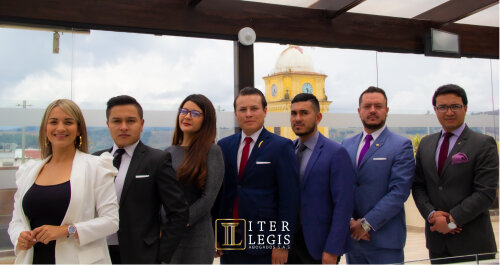Best Civil Rights Lawyers in Tunja
Share your needs with us, get contacted by law firms.
Free. Takes 2 min.
List of the best lawyers in Tunja, Colombia
About Civil Rights Law in Tunja, Colombia
Civil rights in Tunja, the capital of the Boyacá department in Colombia, are protected by both national and local laws. Civil rights ensure that every individual is treated equally, without discrimination based on race, gender, age, religion, disability, sexual orientation, or other protected status. The Colombian Constitution of 1991 provides a strong legal basis for the protection of fundamental rights, such as freedom of speech, freedom of religion, the right to a fair trial, the right to privacy, and the right to participate in public life. Local government institutions in Tunja are responsible for upholding these rights, and there are various avenues for residents to seek redress if their civil rights are violated.
Why You May Need a Lawyer
Engaging a lawyer who specializes in civil rights is essential if you believe your rights have been violated or if you are facing discrimination. Common situations where someone in Tunja may require legal assistance include:
- Unlawful arrest or detention by authorities
- Discrimination in schools, workplaces, or public spaces
- Denial of access to public services based on personal characteristics
- Violation of privacy, such as illegal searches or data misuse
- Issues related to freedom of expression or peaceful assembly
- Professional or governmental misconduct affecting individuals' rights
- Problems with due process in judicial or administrative matters
A qualified lawyer can help you understand your rights, assess your case, guide you through legal processes such as filing complaints or tutela actions, and represent you before local authorities or courts.
Local Laws Overview
Colombia's legal framework governing civil rights is rooted in the national constitution and developed through various laws and court decisions. In Tunja, key aspects of civil rights law include:
- Right to Equality: Every individual has the right to equal protection under the law. Discrimination due to race, color, sex, language, religion, or political opinion is prohibited.
- Right to Due Process: All citizens are entitled to fair treatment in judicial and administrative proceedings. The tutela action is a legal mechanism allowing individuals to seek immediate protection of fundamental rights.
- Freedom of Expression and Assembly: Individuals are free to express their opinions and peacefully assemble, subject to regulations preserving public order.
- Protection Against Unlawful Detention: Authorities must have legal grounds for arrest or detention, and detainees have the right to be informed of reasons and have access to legal counsel.
- Local Enforcement: Local government bodies such as the Personería Municipal oversee civil rights compliance and provide guidance to citizens.
Tunja also implements local ordinances to support civil rights, often guided by national policies and supervised by regional human rights offices.
Frequently Asked Questions
What are my basic civil rights in Tunja?
You are entitled to equality before the law, protection against discrimination, freedom of speech and assembly, privacy, due process, access to public services, and participation in civic life. These are protected under the Colombian Constitution and reinforced by local laws.
How can I file a complaint if my rights are violated?
You can file a formal complaint with the Personería Municipal of Tunja, the Defensoría del Pueblo, the Procuraduría, or initiate a tutela action in court for immediate protection of your rights.
What is a tutela and when should I use it?
A tutela is a legal action that offers rapid judicial protection for fundamental rights when other remedies are ineffective or unavailable. You can file for a tutela if you experience an urgent threat to your rights.
Can I get legal help for free?
Yes, individuals with limited resources can access free legal aid through the Consultorios Jurídicos of local universities or through the Defensoría del Pueblo.
What should I do if I face discrimination?
Gather evidence of the discrimination and consider contacting the Personería Municipal, the Defensoría del Pueblo, or a qualified civil rights attorney to discuss your case and explore remedies.
Are my rights protected during interactions with police?
Yes, police must respect your civil rights. You cannot be detained without legal cause, and you have a right to be informed about the reasons for detention and contact a lawyer.
Can children and minors receive civil rights protection?
Yes, children and minors are entitled to special protection by the State. Their rights are safeguarded both by national laws and dedicated local institutions.
What can I do if I was a victim of abusive government action?
You may file a complaint with oversight agencies such as the Procuraduría, Personería, or Defensoría del Pueblo, and consider legal action for compensation or redress.
Is discrimination based on sexual orientation or gender identity illegal in Tunja?
Yes, discrimination based on sexual orientation or gender identity is prohibited by Colombian law, and you have avenues for legal recourse if you are affected by such discrimination.
How long do civil rights cases usually take to resolve?
The timeline depends on the complexity of the case and the type of legal process involved. A tutela can be resolved in a matter of weeks, while other cases may take several months or longer.
Additional Resources
Several organizations and government offices in Tunja and at the national level offer support and guidance for civil rights concerns:
- Personería Municipal de Tunja: Local ombudsman's office for filing complaints about rights violations.
- Defensoría del Pueblo: National Human Rights Ombudsman offering legal guidance and advocacy.
- Consultorios Jurídicos: University legal clinics providing free advice to low-income residents.
- Procuraduría General de la Nación: Government oversight body supervising public authorities' conduct.
- Judicial Branch: Local courts where legal actions such as tutelas are filed.
Next Steps
If you believe your civil rights have been infringed in Tunja, consider taking the following steps:
- Document incidents and gather evidence, including written records, photos, or witness statements.
- Contact a trusted legal professional or local ombudsman's office for initial advice.
- File formal complaints with relevant authorities or government offices as appropriate.
- If urgent, explore filing a tutela action for immediate protection of your rights.
- Seek support from advocacy organizations or legal aid clinics.
- Stay informed about your rights and local procedures to ensure your interests are protected.
Consulting a lawyer experienced in civil rights law is the most effective way to ensure that your case is handled correctly and that you receive the protection and compensation you deserve.
Lawzana helps you find the best lawyers and law firms in Tunja through a curated and pre-screened list of qualified legal professionals. Our platform offers rankings and detailed profiles of attorneys and law firms, allowing you to compare based on practice areas, including Civil Rights, experience, and client feedback.
Each profile includes a description of the firm's areas of practice, client reviews, team members and partners, year of establishment, spoken languages, office locations, contact information, social media presence, and any published articles or resources. Most firms on our platform speak English and are experienced in both local and international legal matters.
Get a quote from top-rated law firms in Tunja, Colombia — quickly, securely, and without unnecessary hassle.
Disclaimer:
The information provided on this page is for general informational purposes only and does not constitute legal advice. While we strive to ensure the accuracy and relevance of the content, legal information may change over time, and interpretations of the law can vary. You should always consult with a qualified legal professional for advice specific to your situation.
We disclaim all liability for actions taken or not taken based on the content of this page. If you believe any information is incorrect or outdated, please contact us, and we will review and update it where appropriate.









